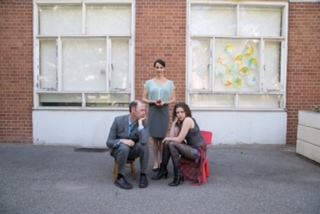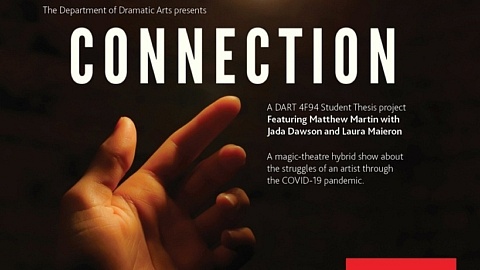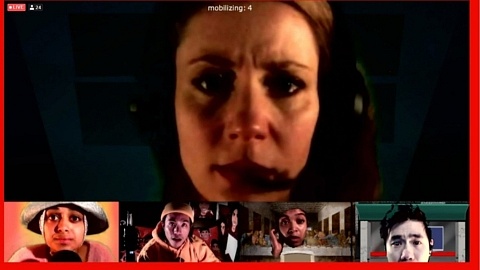“The magic of theatre” – a common descriptor of productions and a personal favourite explanation as to why I love the arts. Theatre has an ability to...
Class is in session
For the second time this year, leading Canadian playwright George F. Walker has premiered a new work in the Niagara region. Following on from The Ravine, produced by Lyndesfarne Theatre Projects in Niagara Falls in May, CrazyLady Theatre Productions opened Parents Night at the Pearl Theatre Company in Hamilton this month, directed by Brock Dramatic Arts graduate Wes Berger. The DARTcritics went along on October 2. Here are two of their reviews.
Mary Asquith writes: Parents Night reminded me why I don’t want to be a teacher. In its world premiere in Hamilton, Ontario, director Wes Berger delivers a new work by George F. Walker about the stressful life of a third-grade teacher. Throughout the show, teacher Nicole (Sarah Murphy-Dyson) has to deal with the demanding parents of her students, while dealing with her own dysfunctional family. It would be enough to drive anyone insane.
Meet the parents! First in the classroom is John (Matthew Olver), a stressed-out, suited-up businessman making inappropriate jokes. His wife has left him and his son, and he worries that his son isn’t doing well enough in school. Next, we meet Rosie (Dana Pudicombe), an outspoken, working-class young woman. She recently split from her drug-addicted boyfriend, and is worried that her eight-year-old make-up wearing daughter isn’t comfortable in class.
The play relies on the trope of “people brought together and stuck in a room until they work out their problems.”This was brought to my attention during the bows when they played the song from The Breakfast Club, “Don’t You (Forget about Me).” The only problem is, in Parents Night, they aren’t actually stuck. The three characters never leave the classroom for very long, despite the fact that they could go home any time. Why would single parents stay at the school so long with kids at home? Why would a teacher walk out on her own classroom, and then come back to stay even later? What keeps them there? These questions are never fully answered. Perhaps this is due to Berger’s unclear direction with respect to character motivation, but it is also a fault of Walker’s script. Without the urgency of a bigger overarching problem, the characters are essentially complaining about their lives to each other, with little action. At an hour and twenty minutes without an intermission, this gets monotonous; while the characters introduce a number of provocative subjects, few seem to land with any dramatic payoff.
While the plot of Parents Night might not include a lot of action, the actors made use of a great set designed by Nancy Anne Perrin. At first glance of the stage, I was hit with memories of my elementary school days: The walls were adorned with what appeared to be actual children’s artwork, the blackboard said “Welcome, parents!”and desks were gathered around in a semi-circle. This sense of familiarity and nostalgia was a great way to non-verbally set up the play before it actually began. Since the show took place in “real time,” it felt like a slice of real life.
What seemed like an interesting premise for a play ended up being a play that was just a premise. While it was entertaining for a while, a good idea can only go so far. Since this was the world premiere, I hope that future productions will attend more closely to issues of intention and motivation, given that they are not clearly provided in Walker’s script.
Trella Noctor writes: George F. Walker’s latest play Parents Night, which had its world premiere at the Pearl Company Theatre directed by Wes Berger, is an honest take on parents trying their best to raise their children, and a Grade Three teacher trying to hold it all together.
This parents’ night meeting was anything but a conversation of the student’s progress. The teacher, Nicole (Sarah Murphy-Dyson) struggles to stay professional while being bombarded by accusations from a wealthy businessman, John (Matthew Olver) and a financially struggling young mother Rosie (Dana Puddicombe). John believes his son Patrick should be at a higher reading level, and Rosie accuses Nicole of treating her daughter Sonya like “a dummy.” It soon comes to light that Sonya and Patrick’s problems in school are more than likely related to their home life.
The set (designed by Nancy Anne Perrin) will bring up memories of your elementary school classroom: drawings from art class; a mat for story time; and a bulletin board adorned with of the letters of the alphabet, paired with phonetically matching pictures.
Murphy-Dyson plays the character Nicole with specificity and ease. She allows the audience to see the struggles of a teacher being belittled by parents, while trying to remain composed. Murphy-Dyson’s calm façade is contrasted by the increasingly visible veins on her neck, and the red hue of her face. Her growing frustration leads to outbursts towards the parents. Murphy-Dyson moves through emotional states gradually, with the ease of a skilled actor. She convinces as a teacher trying to do her best but falling under the increased pressures of the school system and her own life.
Puddicome plays Rosie as an extremely sarcastic and intimidating woman; by physically backing Nicole and John into corners of the stage she shows her strength. A refreshing moment for Puddicome is when she allows flirtation to creep through Rosie’s harsh persona. She demonstrates this by bringing on a slow smile, and allowing her eyes to light up.
Olver was sometimes unconvincing as he navigated transitions between laughter and crying; overplaying caused his emotional breakdowns to appear comical rather than truthful. However, he began to find more fluid transitions as the play continued.
This play continuously brought up heavy topics, but also provoked an abundance of laughter from the audience, demonstrating that people use humour as a way of coping with life’s hardships. Parents Night is authentic look at adults striving for their best, but often failing miserably.
Related Posts
For nearly two years, theatre lovers have felt entrapped in their own little purgatories. Artists have been unable to perform on stages, and audiences been...
Rick Roberts’ Orestes, directed by Richard Rose, confronts the progressively blurring lines between real life and virtual life in a heightened version of the...
For nearly two years, theatre lovers have felt entrapped in their own little purgatories. Artists have been unable to perform on stages, and audiences been...
Rick Roberts’ Orestes, directed by Richard Rose, confronts the progressively blurring lines between real life and virtual life in a heightened version of the...
Leave a Reply (Cancel Reply)
Twitter Feed
Blogroll
DARTcritics.com is partially funded by the Marilyn I. Walker School of Fine and Performing Arts, in support of student learning; experiential education; student professionalization; public engagement with the teaching, learning and production activities of the Department of Dramatic Arts; new ways of thinking; and the nurturing of links with our communities.







